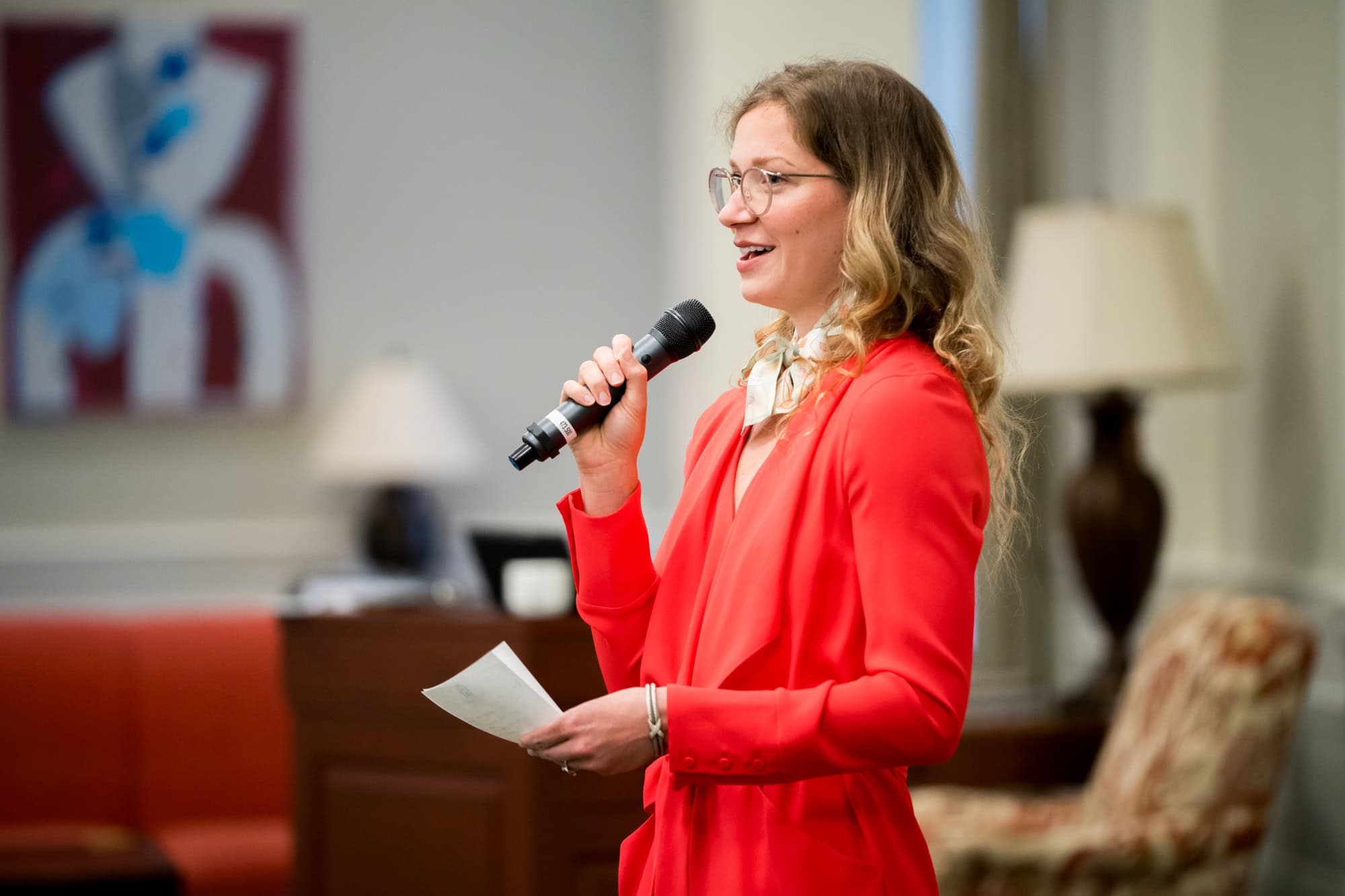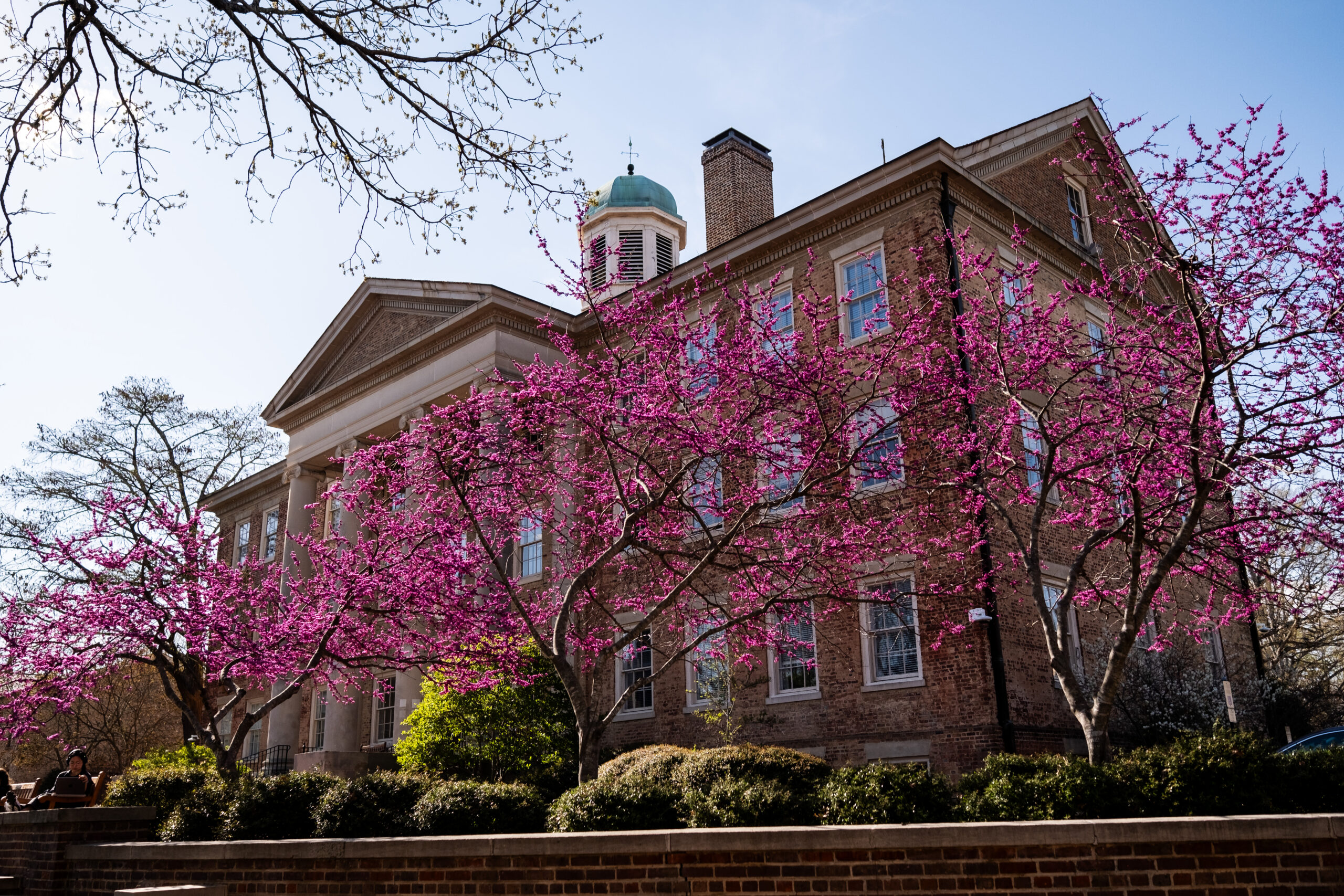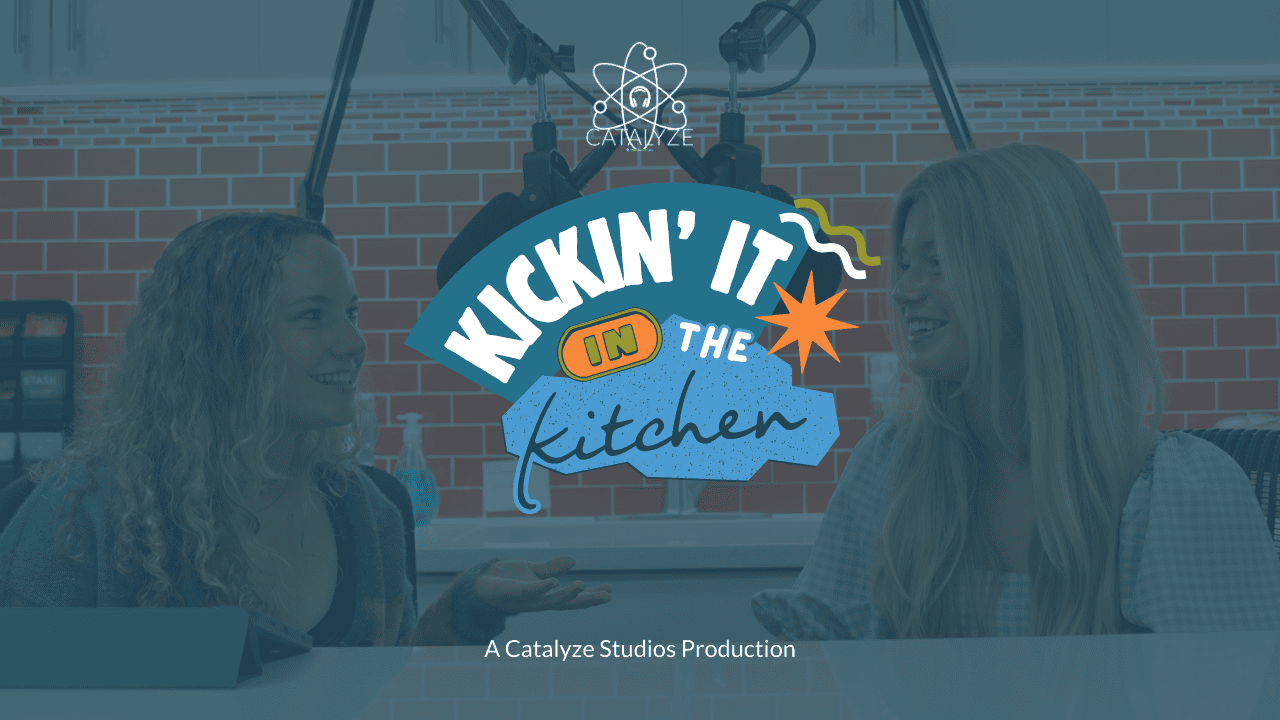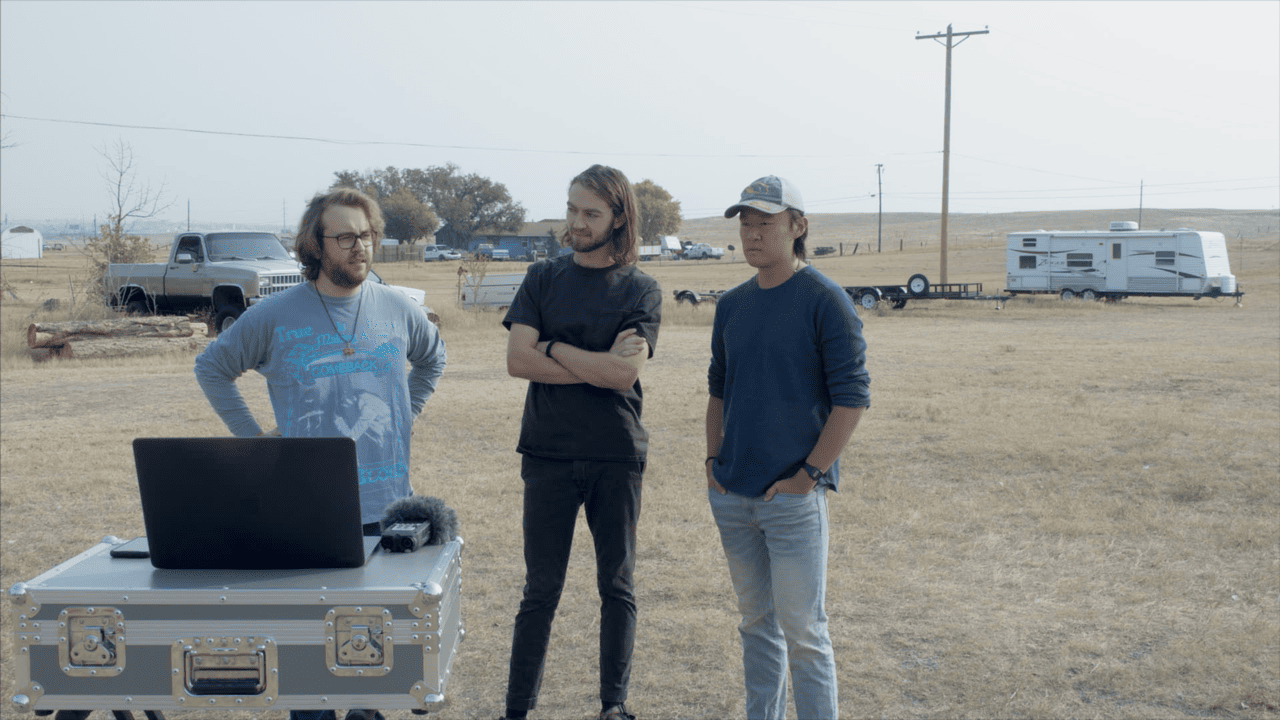
Sam, Nicholas, and Eric spoke with Catalyze on a September morning mid-way through their road trip.
Outside their Airbnb in Cheyenne, Wyoming, three Morehead-Cains shared about their adventures thus far in road tripping across the country with a U-Haul-turned-mobile-recording-unit.
Eric Lee ’18, Nicholas Byrne ’19, and Sam Lowe ’20 had spent the last six months or so with seven other Tar Heels on a historic farm in Colbert, Georgia. The unincorporated community called Smithonia is about 20 minutes outside of Athens. Following Nicholas’s graduation in December 2019, the musician moved to the farm belonging to his grandparents, converted a former commissary into his own production studio, and invited his friends and fellow creatives to stay indefinitely.
After collaborating throughout the spring and summer on music and other entrepreneurial and artistic pursuits to make the most of anxiety-ridden times in quarantine, the “Smithonia 10” have since scattered—all but the current trio, that is. Their mission for this trip is to get Eric back to his home base in San Francisco after taking the hiatus off work to recharge in rural Georgia.
More about the guests
As a student at Carolina, Eric co-founded a microfinance initiative for entrepreneurs in the Triangle area called Build The Hill. He earned a degree from UNC-Chapel Hill in economics and minors in entrepreneurship and philosophy, politics, and economics. Prior to COVID-19, the alumnus was working as a business operations analyst in the Bay Area. Eric worked remotely half-way through the summer before deciding to take full advantage of time with friends during extraordinary circumstances.
Sam will also be joining the West Coast community of Tar Heels to pursue a master’s degree in computer science from Stanford University beginning in January 2021. The alumnus was a computer science major with minors in cognitive science and music. As a scholar, he applied for and was awarded a Morehead-Cain Lovelace Fund for Discovery grant to visit Stanford’s Center for Computer Research in Music and Acoustics (CCRMA).
As for Nicholas, he plans to continue focusing on his solo digital music project Arts + Crafts and on freelance video assignments. Throughout this year, he has worked on a number of digital advertising and social media campaigns for major Nashville-based artists including Luke Bryan, Sam Hunt, and Keith Urban. Nicholas and Sam also released an EP the day after recording this interview. Listen to “Slowe Byrne.”
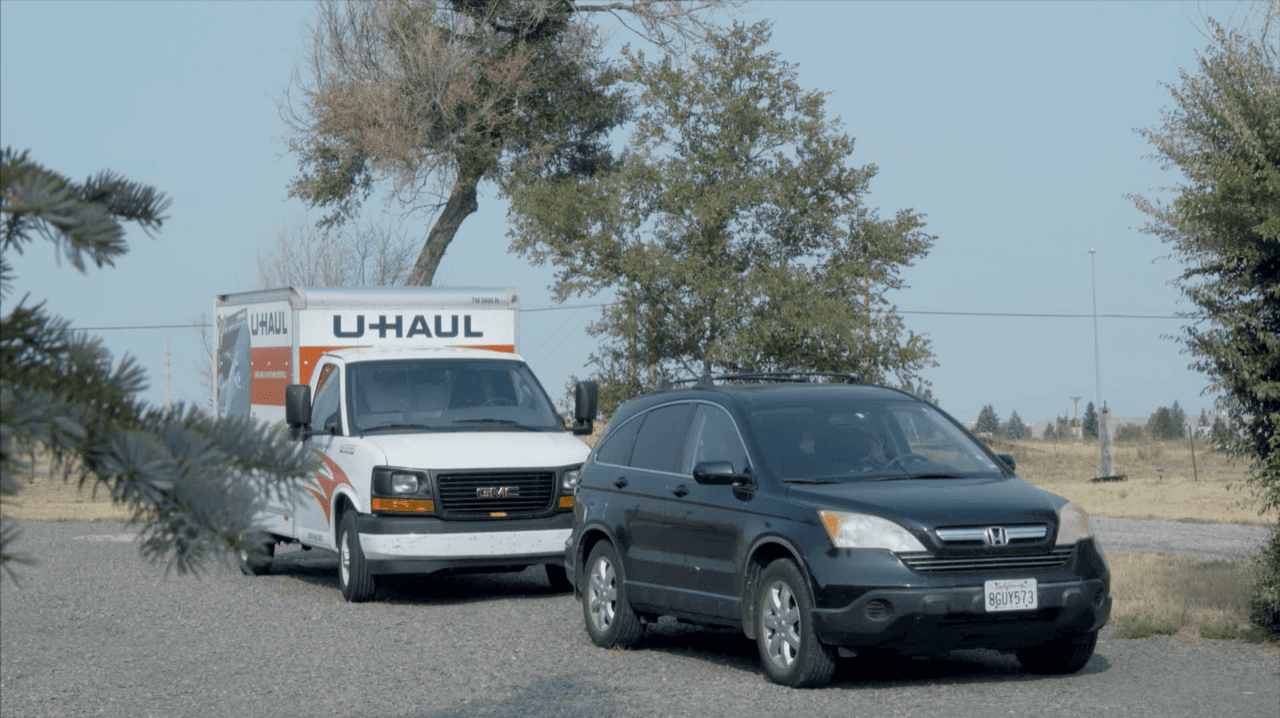
The three alumni travelled over 2,500 miles to get to the West Coast.
U-Haul sponsorship
During Sam’s junior year, he applied for and was awarded another Discovery Fund grant to rent a 15-foot U-Haul to use as a mobile recording studio. The recent graduate and Cameron Champion ’20 collaborated with musicians throughout the trip, eventually arriving in New Orleans, Louisiana.
Before embarking on this fall’s road trip, Sam contacted U-Haul to pitch a partnership in documenting their journey to the West Coast. The company agreed to sponsor based on their previous success and content.
You can follow along their road trip to California on Instagram:
- Follow “Haulin’ Sessions”
- Follow Nicholas @art.sandcrafts
- Follow Sam @sacra.monet
- Follow Eric @eric_zone
Music credits
The music for this episode, entitled “The Softest ‘Yo’ Ever Spoken,” is by Nicholas Byrne (Arts + Crafts) and Sam Lowe (Sacra Monet).
How to listen
On your mobile device, you can listen and subscribe to Catalyze on Apple Podcasts or Spotify. For any other podcast app, you can find the show using our RSS feed.
Catalyze is hosted and produced by Sarah O’Carroll for the Morehead-Cain Foundation, home of the first merit scholarship program in the United States and located at the University of North Carolina at Chapel Hill. You can let us know what you thought of the episode by finding us on Twitter or Instagram at @moreheadcain or you can email us at communications@moreheadcain.org.
Episode Transcription
(Sarah)
Well, Sam, Eric, and Nicholas, thanks so much for being here and for talking with me even as you’re on this road trip.
(All)
Thanks for having us.
(Sarah)
Tell me a little bit about where you are and what you’re doing.
(Sam)
So, we are currently in beautiful Cheyenne, Wyoming. We are on a road trip back out to San Francisco, tagging along with our buddy Eric here who needs to get back out to the Bay Area post our fun summer down in Smithonia, Georgia.
We’ve had a solid two, long driving days so far to really push out west and get us out here. I think we’ve logged a total of like what, twenty-two, twenty-four hours of driving to get to this point from Athens? So we’re jumpstarting the trip that way so we can really enjoy ourselves out on this leg and explore a little bit more.
When Eric came to us with this idea for this road trip, Nicholas and I were both very interested in joining and we needed to figure out a solid way for us to get out to California in three weeks and not have to drive back in another three weeks. I had actually done the U-Haul sessions project with Cameron Champion, a fellow Class of 2020 scholar, last spring break when we were both juniors. It was a Discovery Fund project that let us turn a 15-foot U-Haul into a mobile recording studio and drive it down to New Orleans and back. We collaborated with musicians along the way, documented our journey on Instagram, and while we were on the road that time, we actually realized that this seemed like a great opportunity to actually partner with U-Haul because the content we were producing seemed relevant to their business, it seemed interesting and engaging, and it seemed off-the-beaten-path from the kind of stuff we were seeing from their social media channels.
These two streams converged, and I had the idea that we should reach out to U-Haul to show them all the stuff that we did on that last trip and see if they were interested in partnering with us to do something on this one and they were. We have a solid 10-foot U-Haul trailing behind Eric’s lead car throughout the drive filled with camping gear, which came in super clutch for that. We were able to pack up some wood and supplies to get us out here and it’s got a pretty lean mobile recording studio setup as well because we had to get a little bit more creative this time since we have to fly back with it all. It’s been really exciting and we’re excited to see where it goes from here.
(Sarah)
I just imagine that being in a U-Haul, even if you weren’t trying to create all these beautiful stories and interesting content, that that would be difficult in and of itself. And so how do you manage that from inside the van in producing things and still managing to be healthy and safe?
(Nicholas)
Well, Eric is a near professional in planning road trips. Having a good plan is certainly necessary. We drove 14 hours yesterday. Before that, we had a day of rest and the day before that, we drove ten hours. I think we’re going to be rewarded on the second half of this road trip by doing all the driving on the front end. And also, it’s kind of a bit more beautiful and has the road-trippy visuals are far as what we’re going to film out west. That was definitely a good idea on our part.
Also, I would highly recommend AC invertors for cigarette lighters in your car because you can plug it into a power strip. I was in the car yesterday, producing a couple of songs in the back seat as Eric was driving, and it’s fun to take videos and photos along the way. As we learned from Cam this summer, it’s often a good idea to film stuff and then post it later so that you have a little bit of time to bank content so that you’re not stressed today about, “Oh, we have to post this thing today” [or] “We have to post this thing tomorrow.” You can actually give yourself a five-day buffer period or something like that. The difference whether you’re on the road today or in five days, and so, it makes it a little bit more comfortable, lets you control the narrative a little bit better as far as what kind of things you choose to include in your head.
Eric, do you have any other road trip tips just in general?
(Eric)
I have a lot, but I don’t know that all of them are relevant to the storytelling aspect.
(Sam)
I think the actual drive times on the U-Haul, especially on the back half of the trip, now that we’ve gotten these big drives out of the way, turned out to be really useful in terms of giving yourself some cordoned off space where you’re going to be in the car so you can do things like do social media, reach out to people, polish off stuff that we’ve been working on the night before on the computer. The drive itself actually becomes a really valuable tool in the storytelling side of things because it forces you to strike some sort of balance.
(Sarah)
Nicholas, I know you’ve been working with Nashville artists, and Sam, you have music, and there’s been so much collaboration happening over the summer. Can you share some of what exactly you’ve [each] been trying to do as well as enjoy time amidst a pandemic?
(Nicholas)
Yeah, so we tried to stay really busy this summer. And I think at the beginning of the pandemic, we all realized that we were alone in our bedrooms and that it would be really wonderful to be together and to figure out a way for that to be possible. And very fortunately, my grandparents have some space out in Colbert, Georgia, right outside Athens, and there is an old building called a commissary, and I’ve turned into a recording studio since graduating in December. And on the top floor of this building, we had five beds. We packed ten of our friends into Athens this summer. Five people were sleeping in the bedroom, it was kind of like summer camp. We learned a lot about community and the time that I think we all needed. And we all have a variety of personal interests but also professional interests, and it was really wonderful to be able to spend that time together and to have a semblance of normalcy as things were upended for many of us.
Before the pandemic, I was booking a lot of shows and working on stage design and performing. And so, for me, it’s been a transition to work on more stuff in the studio, which has actually been a blessing. That’s what I’ve wanted to do for a while. I’ve been practicing, recording, singing and playing guitar, and writing music with Sam and Cam and several of our friends this summer. It was really wonderful.
Professionally, I was working on some freelance projects. When I was a sophomore I interned for Universal Music in Nashville, and then since then, I’ve been doing freelance video editing for them and for a variety of other artists, basically taking music videos and chopping them up and making advertisements out of them. I studied advertising at UNC. Then throughout college, I did a variety of music industry internships. And earlier this year and early in the summer, I was working on Sam Hunt’s recent album release and did all the ads, all the social media ads for that project, which is really cool.
Mostly I’ve actually started to really transition towards focusing on my own work. And that was a really huge thing for me and why I decided after December not to move to Nashville or move to Los Angeles. I actually moved to Athens to spend time at the farm starting in January. It was really wonderful to have all these friends come down and visit because I was planning on going out on tour essentially and playing my own music and cooking shows and doing that kind of thing.
I think we definitely made the best of the situation. We got to hang out with my grandparents a lot and they love that. We learned a lot from that, a lot from each other as well.
(Eric)
I personally got pulled into the Smithonia 10 from just a random off-the-cuff phone call with Nicholas that we had, when was it? Might’ve been like late April, so a little bit into the pandemic. Like Nicolas said, we were all kind of cooped up in our rooms and I think it mainly developed pretty organically. I know a lot of folks who were already planning to come to Athens and some folks who weren’t but when the opportunity arose, it sounded like a really great way to make the best of a weird situation.
I was really interested to come out because in San Francisco, I’ve been pretty involved in the co-living, co-housing community. It’s been a pretty long-standing place where a lot of communes have formed. And I actually started a co-living house in February, which went really well for about a month until everything imploded. About around March, San Francisco was a less inviting place to be living so when the opportunity came up, I was really excited to go to Georgia.
(Nicholas)
The property itself is historic. My grandparents moved there and purchased part of the land in 1996, which is the year that I was born. And the building that we were living in was in ruins. Over the past twenty-four years, they’ve renovated it and rebuilt it. We call it “The Commissary” because that’s what it was. It was originally part of Jim Monroe Smith’s plantation outside of Athens, Georgia, which was a sharecropping plantation and one of the largest in Georgia at the beginning of the 20th century and late 19th century. It’s certainly a place that makes you think and I think we all had many moments of reflection this summer about thinking, what does it mean to write music here or what does it mean for this group to be here, now? I think a lot about what that place will be in the future. It’s certainly thought-provoking and this year has been especially interesting to look at that history.
My grandparents took a plot of land and built their house and built a lake and it’s really a place that my family has gathered since I’ve grown up. And it’s interesting for me, because it’s all the trees are the same age as me. And so as they grow, I guess I grow.
(Sarah)
And I also heard that in addition to working on all of these projects, that Eric, you are the cook-meister. And so, I just have a question: if somebody wanted to roast a pig, how would you say to do that?
(Eric)
So ideally, you have a large already constructed barbecue pit and you can also make one out of cinder blocks on the fly if you don’t have one already. You need to keep the coals from flaming up, you want to keep the coals burning outside of the pit until they kind of simmer down and keep the heat indirect. When we cooked a pig on the Fourth of July, we had it kind of splayed out in the middle and coals basically around the edges and mostly in the corners of the pit.
We started around 5:00 p.m., was it? And went all the way through the night. And I think it was finished cooking about at noon the following day. It’s definitely a bit of an undertaking and more than maybe you want to do on a regular basis.
(Nicholas)
I think also something key is that we’re still eating the pork.
(Sam)
It’s the ultimate meal prep. I think we could eat pork for like three months.
(Eric)
It was about a 90-pound pig that we cooked on the Fourth of July and we got maybe like twenty pounds left.
(Nicholas)
What’s also key is storing that pork. We’ve made this mistake because you don’t want to put it in too large of a container in the freezer. You want to put it in meal-sized containers almost so that you don’t waste pork as you take it out of the freezer and are not able to eat all of it before it goes bad. We have a lot of quarts stacked up and the deep freeze.
(Sarah)
A lot of things to remember then! Seemed like such a unique environment to be reinforcing the kinds of skills and creative process that you were all on, even though in different ways, but were there any new skills that you might have learned or takeaways from the summer and into now that have stuck out to you and maybe changed the way that you’re approaching this fall and the rest of this crazy year that has been 2020?
(Sam)
I think it definitely has done that for me in a lot of ways. So on the flip side of what Eric was saying for his impetus for coming down to Smithonia, I was talking with Nicholas about moving down to Athens for probably half a year at this point, because through all the craziness of planning postgrad, my senior year, a lot of scholarship and fellowship applications and then the uncertainty that all of that engendered, knowing that no matter what, I could come down to Athens, work on music, work on really cool projects with Nicholas, was a lifeline for me through all of that, honestly.
And then when things finally did work out and I was offered a position in the master’s program of computer science at Stanford, it was really hard to let go of that idea of coming down to Athens and give myself this time to reset and take a break away from the past 18 years of school and give myself the time and the space to really explore the things I knew I wanted to do and knew I wanted to learn, but didn’t necessarily have the ample time and space for it before.
I’ve gotten to learn a ton of new skills. I was helping Eric with some of the pit mastering and learning some barbecue along with him. A couple of weeks ago, I actually finished building a guitar amp cabinet with Nicolas’s other grandfather, who lives on the other side of Athens. He’s got a great workshop, great woodshop, incredibly nice dude. Got to learn a lot and get my hands on a lot of tools and then just the time to really dig into the craft of the music that I want to make and that kind of stuff, that kind of thing.
It’s really been a realigning experience for me in a lot of ways. I had actually Discovery Fund-ed a trip out to Stanford after my freshman year to work with CCRMA, which is the Center for Computer Research in Music and Acoustics. And basically, all of the stuff that I’ve done since then has had a lot of overlap with the kind of stuff that they do, but I was still a little hesitant with jumping in with them when I get to Stanford to try and do research with them, because I still had this interest in AI and the different avenues that that could take me and not sure that I wanted to commit to the whole music angle of it or what have you. And having this time to really work on my music has really reaffirmed to me that that’s what I need to do and that’s where my passion is. This summer has been incredibly valuable because if I had just jumped into this master’s program at Stanford in the fall, I think it would be a very different experience than the one I’m planning on having in January.
(Nicholas)
And Sam and I actually have an EP coming out tomorrow. My project is called Arts + Crafts, and his is called Sacra Monet and we have a collaborative EP called “Slowe Byrne,” which is really fun. So we’re working on building stuff for that project out here and working on new music as well.
I think something that I learned this summer from Eric is to not let the pursuit of perfection get in the way of releasing music, to be specific.
I’m at the stage where I want to become a better producer and a better musician. And the way to do that is to write and release songs. And if you’re just writing one song over and over again, and not releasing it, that does not further that goal. It feels like you might be because it’s probably not going to be The Song if it’s your first one you’ve ever put out.
(Sam)
Perfection is an arbitrary term that’s only relative to where your skill set is.
(Eric)
For me it was a really exciting experience to be surrounded by so many of my creative friends. I graduated actually in 2018, and I’ve been living out in San Francisco for coming up on two years. I had been when I came out to Georgia and in that time, I’d spent most of my time establishing and developing a professional skill set and a professional identity and really had been, maybe not neglecting, but ignoring my appreciation and desire to be surrounded by and creating art.
And it’s been really interesting being surrounded by essentially professional creatives and being exposed to that energy. I think I was really excited to be hearing everyone’s new music every day. I would definitely try to crack the whip on being prolific and releasing stuff and getting feedback, because I would always hear them kind of in the commissary giving each other feedback, but also feeling like it wasn’t good enough. And to me, it sounded good enough already.
So that was really great. And I guess, the summer overall was just a real realigning experience. I actually left my job at the end of June, so halfway through my time in Smithonia, I wanted to give a little bit more time to barbecuing, becoming a stronger swimmer, getting better at pool, doing a lot of extracurricular things that I didn’t really have a lot of time to do when I had a full time job.
I think this has been a really great sabbatical and I’m really excited and really grateful to have had the experience and also excited to get back to San Francisco and back to my life in California as well.
(Sarah)
I’m so glad to hear that it’s been inspiring to be with each other and realizing that you can be a bit messy or not your older idea of perfection in order to do good work. As you are thinking towards the end of the year and beyond that, what are you looking forward to and hoping to accomplish, and using the word accomplished maybe not in the traditional forms of success, but just what would be meaningful to you and then ways that you’re thinking about approaching those things?
(Eric)
I think the next couple of months are almost certainly going to be a tumultuous time, especially as we approach the election. I think for me, it’s been most beneficial to get that minimal headspace, especially since we’re still a couple of months out. I’m hoping to reintegrate back into my house in San Francisco. I’m considering and looking around at potential new employment options, but I’m also giving myself time. I think one thing that’s been really nice about this new time looking for jobs compared to my experience postgrad is now I have a little bit more savings, more skills, more connections, and I think I have the ability to be a little bit more selective and I’m hoping to find l job that I find rewarding and personally fulfilling as well as professionally. I think one other thing that I’m definitely trying to accomplish in the next few months is spend a little bit more time at home with my family. And one thing that’s been really, really great about the pandemic, actually, is that I’ve been able to spend a lot more time in large, contiguous blocks with my family at home than it otherwise would have been as an adult living his own life out in the big city. I spent a lot of time hanging out with my parents, spending a month or two at a time with them, and trying to develop our relationship and learn a little bit more about them and how they’re responding to the current situation and also kind of their history and how they view the world. That’s also been a really great project.
(Nicholas)
I’m also really excited about releasing as much music as possible and growing as an artist, figuring out how to use my voice. And I think it’s also exciting to see the ways that people in my community have been engaged politically, to know that people really still do care. I think I’m also going to do a retreat with Eric in January, and I’m looking forward to that.
(Sam)
I think just for me personally, just the kind of personal growth I feel like I’ve had over the summer, I’m most excited about seeing how those new lessons shape the future for me, especially like we were talking about coming into Stanford with my priorities a little bit more in line and especially navigating back into an academic space. Now that I better understand how I work well when I’m doing my creative work and my music, which is something that I’ve always been passionate about but haven’t really been able to do it at this level of productivity. And so I’m moving back into the academic sphere. I definitely want to keep that balance more in line. That’s something I’m really excited about.
(Sarah)
Well, thank you guys so much for your time. Wish you guys all the best.
(Sam)
Thank you so much.
(Nicholas)
Thank you, Sarah.
*This episode has been edited slightly for clarity.
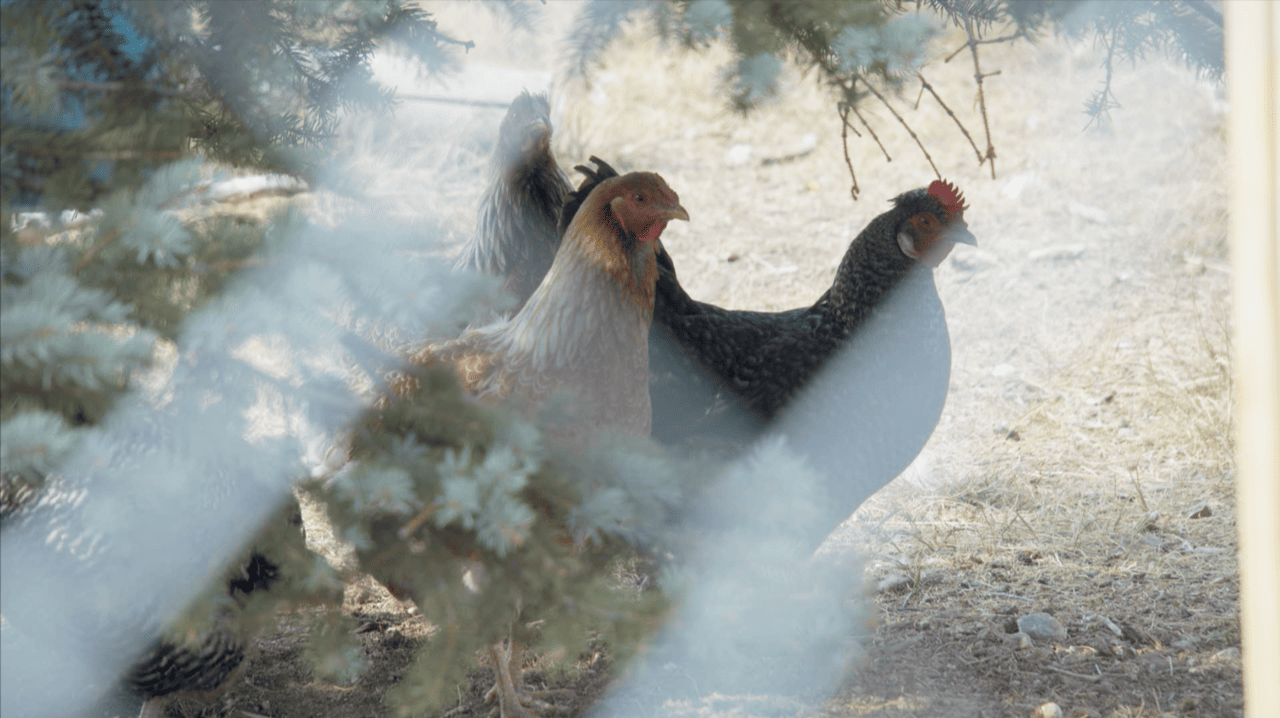
Some friendly neighbors outside of the alumni’s Airbnb in Cheyenne.
